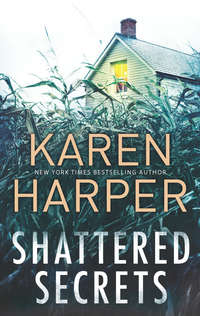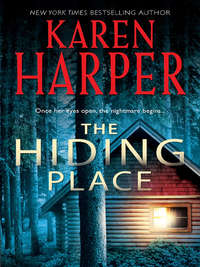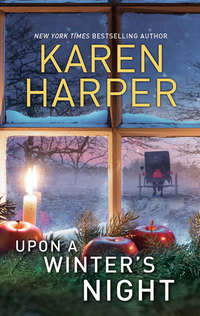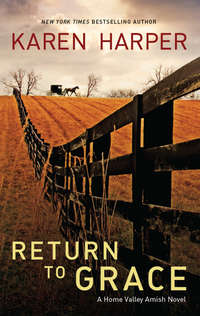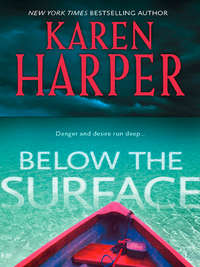
Полная версия
Finding Mercy
“I want to, so I’ll get busy here. The bees won’t sting me, will they?”
“Not if you let them be themselves and don’t try to take over what they do best.”
“I hear you loud and clear, Ella Lantz. Okay, boss, I’ll get to work.”
She watched him lean on his crutch, put his weight on his good leg and start to pull weeds. Though she just tried to accept the way things were, she was aching to know what he was hiding from. Had he left loved ones behind? A woman? A family? Even children? How she would hate being forced away from her life here. That thought chilled her and she shivered.
* * *
Ray-Lynn had carted her bouquet of lavender into the restaurant because it cheered her up. She put it right on the table where folks came in, near Ella’s products she sold, under the front door sign that spoke of both her love of her Southern roots and of her adopted neighbors, the Ohio Amish: Y’all Come Back Now. Danki!
Jack was sitting in the back booth, facing the front door as he always did when he was here so he could keep an eye on things. Keep an eye on her too, she knew. Both he and Hannah had told her that Jack and she had been dating for a while and had been getting very involved before her accident and coma, whatever very involved really meant. She was embarrassed to ask Jack and wondered how much he really knew of her—had seen of her, in the flesh.
She was finally getting up the courage to ask him how intimate they had been and what he really wanted from her. They were business partners—she had the legal document that explained that—but had they been bed partners, too? Evidently taking the high road, good guy that he was, Jack had not pressured her on resuming where they left off—and just exactly where was that?
Today he looked not only bleary-eyed from getting little sleep after that car wreck last night, but she could tell he was upset by something the stranger who had joined him was saying. Jack, tall and imposing in his uniform, even sitting down, seemed to dwarf the outsider, a compact, balding man, maybe in his late fifties, with graying, reddish hair and a creeping hairline. He reminded Ray-Lynn of a rumpled professor and kept gesturing as he talked. Ding-dang, they looked at odds, but they were keeping their voices down, leaning forward over their empty plates, as if they’d like to leap over the table at each other. When she’d refilled their coffee cups, she had overheard only that the guy’s name was Branin, nothing else.
She went over with their check herself. Although Jack owned half of the restaurant, he always insisted on paying. She should, she thought, carry the big bouquet of lavender right over to them and plunk it on their table, since its smell was supposed to calm people down.
“…still say I should’ve been told up front, not after the fact…” she heard Jack mutter.
“We had to get him placed,” Branin said. “Since the Amish were willing and we had a go-between, it happened real fast…”
They stopped talking and looked up at her. “You two gentlemen need anything else?” Ray-Lynn asked, and put the check on the table.
“We’re doing fine,” Jack said. “Thanks, Ray-Lynn.”
She and Jack exchanged one of their “see you later” looks and she walked to the next booth and chatted with those patrons while keeping an ear cocked. Branin was saying, “Sorry I tracked you down here. Your office dispatcher told me where you’d gone. I appreciate your inviting me to join you for breakfast, Sheriff.”
“So, you staying in the area for a while? Don’t you have to get back to D.C.?” was the last thing she heard as she saw new patrons come in and went to seat them.
D.C.? Washington, D.C.? Having to put up with that FBI Agent Linc Armstrong from Cleveland a while ago was one thing, but D.C.? At least her car accident and coma had not hurt her curiosity, even though it was said that was what killed the cat.
* * *
When Ella saw that one high patch of her hardy Hidcote lavender had their flower heads about one-third open—which was ideal picking for sachets—she decided to take a break from weeding, get her hand sickle and cut some. The morning breeze and sunshine had dried out the foliage and flowers well enough for cutting.
“You are allowed to take a rest, you know,” she told Andrew as she started past him down the hill. “I’ll be right back. Oh—look,” she told him as he stood and stretched his big frame, “a car just turned in the lane.”
She could tell he tensed right away. “It looks like the same make of sports car that was in the wreck,” he said. “A white one, though. Do you know who it is?”
“No, but sometimes customers see my sign down the road and just stop by. It’s all right. You can stay here.”
Since no one was at the farmhouse, she walked down to the driveway. It was a stranger, a woman dressed fancy in a pale blue linen suit, white silky blouse and gold jewelry that glinted in the sun. Her hair was sleek and black, collar-length, with flat, straight-cut bangs. The ebony sheen of it in the sun looked so unusual in this area full of fair-haired folks. Just like the young man in the car wreck last night, she looked Asian.
“Hello,” the woman said, nodding. “This is the Lantz farm? Sheriff Freeman told me on the phone where to find it. I’m Connie Lee, Sam Lee’s mother—the man whose car went out of control last night.”
“Oh, ya, how is he doing?”
“Back injuries, two broken legs, but at least they don’t think he’ll be paralyzed. His father’s with him, and we’re having him flown to the Cleveland Clinic, but his long-term prognosis is good. I understand that you and your cousin were the first to reach him and risked your lives to be sure he was out of his burning car. I can’t thank you enough. I wanted to give you this token of our gratitude,” she said, and reached in her purse for a white envelope.
Ella’s eyes widened, not in the surprise at a gift, but because she glimpsed a gun in that purse. A small one, gleaming silver. She tried to keep calm. Amish women might not deal with firearms, but lady Auslanders evidently did.
“Unless that’s just a thank-you note, we are glad to have helped but nothing else is needed,” Ella told her.
“Oh, but—a donation for your church then.”
“It is not our way, but you could donate to our church’s Help Haiti fund—in your son’s name.”
She drew the envelope back. “Haiti? Yes, that was a mess there. How nice of your people. I need to rush today, but let me just mention the other thing then, something that has nothing to do with the accident. My husband, Chang, and I are from New York City, and we’re going to open a luxury spa here in the Home Valley. You know, clients can come for few days or a week, get out of the rat race, lose weight, find peace and quiet. I believe Sheriff Freeman said you are the one who sells the lavender.”
“Yes, Ella Lantz. I’m currently expanding my shop and products.”
“That’s great, because we want to decorate our new spa with country decor, kind of Amish chic. We were thinking of calling our own products we use here the Skinny Spa line, but we’ll probably repackage things as the Sweetgum Spa line, since that’s the road we’re building on. Great buzzword for anything today, you know—skinny. You might want to consider that for your products line. We’d want to purchase and sell for you things like lotions, essential oils, spritzes, scented candles, body candles…”
“Body candles?”
“Right. People love them. They burn with a fragrance, then leave a puddle of warm liquid we use for massages. Well, more later, as I’ll be back and forth, but we are so grateful that you helped save our Sam. He’ll eventually be running the Sweetgum Spa, and I’ll be sure you and your family have unlimited free beauty packages.”
“That’s kind of you,” Ella told her, but it just showed this woman knew next to nothing about Amish anything. “Skinny” products and Amish chic decor around here? No way.
“So, where is the man you were with?” she asked, evidently as an afterthought as she squinted up the hill into the sun. “He seems to have disappeared, but if he’s your cousin, I’d like to thank him in person.”
As if she expected no answer to that, Connie Lee headed for her sleek car, which still had its motor running. She got back in, slammed the door, backed up and drove down the lane.
And the woman was right. Andrew was nowhere in sight on the brow of the hill. Wasn’t he overdoing hiding himself? He was only Cousin Andrew now, not whoever he really was. At least since he’d seemed eager to lend advice about organizing her business, he’d probably be happy to hear there would be a new demand—an expanding market—for her lavender.
She headed toward her house. Surely, with his sprained ankle, he hadn’t hiked higher up the hill. He’d no doubt reappear when he saw the stranger was gone. She got the hand sickle, which she kept good and sharp, picked up a big basket and started back outside, still thinking about Connie Lee, her husband with the strange name of Chang and injured son, Sam. Was that really Samuel, a good biblical name? And in Connie Lee’s world, was that little gun just what this sharp blade was to Ella, a part of her she didn’t even think as a weapon? Because, in Amish country, what could she be afraid of?
Ella startled and almost cut herself when she glimpsed a man standing right outside her kitchen window. Oh—Andrew! But what…why?
Ella hurried outside and around the corner. “Were you hiding there while she was here?” she asked him. “Did you hear anything she said?”
“I saw she looked Chinese, like the driver who wrecked his car,” he said only, not looking at her, but staring at his feet. His crutch rested against the side of the house.
“What is it? What about the Chin—”
“Never mind. But look at this,” he said, pointing at the damp soil beneath her window. “I came down the hill and watched from around the corner to see what was going on and noticed footprints in the ground, pointing inward. See?”
“Ya, well, it rained last night and a couple of days ago. Seth did me a favor and cleaned these windows outside, so that’s probably why the prints.”
“Would he have cleaned every window? Because I’ve almost made it all the way around now and there are the same prints.”
She went with him. He was right. And, for sure, not Seth’s prints, not those of any Amish man, she reckoned, because they were pointy toed with a distinct separate heel, like maybe cowboy boots.
“Not Seth’s,” she said, shaking her head. “Not even Amish.”
“And recent. Maybe made last night, with the rain and all. Let’s go see if they’re at the farmhouse too.”
They were, around all the lower windows, which Seth had not cleaned. The hair on the back of Ella’s neck prickled. Could this be related to that huge eye she imagined on the hill?
“What about the sheriff?” Andrew asked, his voice urgent.
Again, she agonized, what and who was this man hiding from? Despite the fact she was sweating, she shivered. Maybe the prints had been made by someone who wasn’t used to mud, so in the dark he didn’t think about leaving a kind of calling card.
“I—I think the sheriff just wears black shoes,” she told him. “And why would he come here and look in after being here last night?”
“Maybe he knows there’s something fishy about me—but why your place, too, unless he thought I’d be living there and that you were still here in the farmhouse? Can you think of anyone around here who wears boots? That woman wasn’t wearing boots, was she? They could be a woman’s.”
“Andrew, she was at her son’s bedside in a hospital last night. She says they’re moving him to the Cleveland Clinic, so—”
“I’m sorry to involve you in my problems, and if I thought there was one moment of danger for any of you, I’d leave.”
“And go where?” she challenged.
Their eyes met and held as happened far too many times. Ella gripped the hand sickle hard in her hand. For one moment, she thought she should tell him about the reflection she’d seen on the hill last night, but it surely had been one of those tin pans catching wayward light. She didn’t want him to be more upset, or to think he’d have to leave.
“Let’s tell my father about these prints, and we’ll keep an eye out,” she said, longing to comfort him. “My sister Barbara has a come-calling friend from the next farm over, so I’ll ask her when she gets home if it could be Gabe, but he must know she’s not here.”
Ella reached out her free hand to touch his arm. The man was so tense he felt like a carved piece of wood. “Don’t fret,” she said. “Let’s just sniff some lavender, okay? It’s supposed to be as calming as it is stimulating.”
“Sniff some lavender,” he repeated with a little shake of his head. He sighed, and his shoulders heaved as if he was trying to force himself to relax. “As for stimulating,” he told her, “I find peaceful, pacifist Amish country very stimulating.”
His eyes took her in again. What a shift of moods. The man was teasing, almost flirting now—wasn’t he? How she wished she understood worldly ways better.
“So tell me everything our visitor talked about,” he said as he leaned on his crutch and they started back up the hill side by side. “Did she seem to have a foreign accent?”
“There’s something about you and the Chinese,” Ella blurted, when she’d meant to keep her own counsel.
“Have you ever heard of the ‘Don’t ask, don’t tell’ policy, Ella?”
“No. Meaning keep my nose out of it?”
“Truth is, I like your nose—and quick mind—but the less you know, the better.”
“I have heard of the ‘inquiring minds want to know’ policy.”
“You are so honest and open, and I can’t be either, not now at least. Can you trust me enough that we can still be friends—as well as boss and slave, of course.”
She could not stop her laughter any more than she could stop wanting to be around this mysterious man. Whatever danger he was in, he was dangerous too—at least to her usually careful and controlled secret self.
5
RAY-LYNN STOOD WITH her sack of two turkey sandwiches, dill pickles, slaw and raspberry iced teas in the sheriff’s office, waiting for Jack to finish a phone conversation. Lately her attempts to rebuild a relationship with him seemed destined to be overhearing snatches of his conversations with others. Only this time, she knew who he was talking to.
Standing at the back of the reception area near the short hall to his office, she’d figured out he was talking to FBI Agent Lincoln Armstrong, who had helped him solve a murder case here in town. Meanwhile, Ray-Lynn kept up sporadic chitchat with Doreen, the sheriff’s day shift phone receptionist and dispatcher. Doreen was only twenty-two and fairly new to Homestead, so at least, Ray-Lynn thought, here was someone who didn’t know more about her recent past than she did.
She and Jack had arranged to have lunch together today in his office. At least it was past the noon rush in the restaurant. She wished Doreen would quit chattering so she could hear Jack better.
“Have you seen the new deputy who came over from Wooster?” Doreen asked with a roll of her brown eyes. Her reddish-tinted hair—a much wilder color than Ray-Lynn’s—was in tight ringlets that bounced as did her full breasts. “He’s absolutely gung ho about working here—and absolutely darling,” she said in a stage whisper. “Winston Hayes, but goes by Win, and he is a winner! Not married, either.”
“I heard he was coming but haven’t met him.”
Ray-Lynn could tell Jack was giving Agent Armstrong a bad time. “So why did you recommend to Branin sending someone who was a hit magnet to the Home Valley?” Jack demanded. “That’s a fine way to say thanks after what we been through around here lately!”
Now what in tarnation was a “hit magnet,” Ray-Lynn wondered.
“And now that you’ve taken early retirement,” Jack went on, “forget coming anywhere near Hannah. She’s marrying Seth this Friday. Yeah, that’s what I said, so just keep clear.”
Wow, Ray-Lynn thought, cocking her head to concentrate on his voice while Doreen rambled on about Win Hayes. Linc Armstrong had retired from the FBI he seemed to love so much? She dare not tell Hannah, because she’d also have to tell her where she got the info and no way was she admitting to eavesdropping on Jack Freeman, even if she was desperate to know everything she could find out about him—about them. Drat her memory loss. She had to keep calm; she had a lot to be grateful for, to look forward to and live for.
“In other words, Win’s really a good name for him,” Doreen was saying in her southern Ohio twang, which could not hold a candle to a real Georgia drawl. “He’s built real muscular, a little short for a guy—like maybe my height—but he’s got big ideas. I can tell, he’s going places, wants to be a sheriff someday. Does he ever look great in a uniform! I get the vibe of you’re-safe-with-me, but he gives me the shivers at the same time, know what I mean?”
“I do indeed,” Ray-Lynn said as she heard Jack hang up. “Nice chatting with you, Doreen.” As she went down the hall, Jack swept open the door of his office, which had been ajar.
“Hey, didn’t know you were here!” he said with a smile.
“It’s one-thirty. Actually, after. I was waiting in the main office with Doreen.”
“Wish we had time to drive out somewhere nice, ’cause it’s a pretty day, but I ’preciate your bringing this here,” he said, ushering her in and closing the door firmly. He gave her a hug and a quick kiss. Would he guess she’d overheard him? If so, it wasn’t her fault. “Too much going on for us to really connect sometimes,” he muttered as she took the food items out of the sack and placed them on the edge of his desk.
“And that’s something I want—feel I’m ready for,” she said as they sat in his two guest chairs. He had repositioned them in front of his desk so they were facing each other. Jack reached over and put a big, warm hand on her knee.
“I’d like that, honey. I been trying to give you some space and time, but you bet I’d like that, picking up where we left off.”
She almost blurted out the question that had been haunting her: But where did we leave off? Were we sleeping together? Talking marriage? The Ray-Lynn who was rebuilding her memories and confidence after her brain trauma wasn’t ready for any of that, was she? Because she needed to know where they’d been to trust where they were going.
“Let’s do dinner soon,” Jack said as he unwrapped the sandwich she’d made for him herself in the restaurant’s kitchen. “Not around here unless it’s a private picnic somewhere really pretty. You know, my new deputy—”
“Oh, yes, I heard about him just now from his fan club groupie Doreen,” Ray-Lynn said, thinking he was going to talk business now.
“Yeah, real ambitious, doesn’t quite know yet that he doesn’t know much. But I’m glad to get the extra manpower with the crimes we’ve had around here lately. He was fairly new on the Wooster force but volunteered to come here when he heard there was an opening—likes smaller towns and rural folks, he said. Anyhow, I was going to say, Win told me that if you stand on the hill above Ella Lantz’s lavender field, the scent is great and there’s a stunning view of the valley. How about we do wine, cheese, a loaf of bread and thou up there some evening as the sun sets—maybe tonight, if I can get away. It’s short notice, but how about it? I’ll take a radio, bring a blanket, just like in the old days.”
“You know the old days for us are new days to me, Jack. But it sounds wonderfully romantic.”
“That’s what I mean it to be. I think we’re more than friends again. We’ve rebuilt that a different way from what we did the first time, but now we can move on by going back.”
He looked so intent. His sandwich was halfway to his mouth, but he seemed not to know it, and she saw that as a great compliment.
* * *
Ella knew Andrew needed some horse skills, especially hitching and handling a buggy. She was disappointed when Daad told Aaron at midday dinner that he should take an hour and give their guest his first buggy lesson. She’d been planning to take a back road through a field to the mill today and teach Andrew herself along the way. Though it wasn’t her regular day for it, she’d also planned to make lavender deliveries to Amanda Stutzman’s Plain & Fancy B & B and to the Dutch Farm Table Restaurant in town, all excuses to show Andrew around a little more. And, she admitted to herself, just to have more time with him. She had never been so passionately curious about anyone in her life.
Daad called to Aaron as he and Andrew headed out the back door, “Harness up in the barn, so no outsider can see you teaching him.” Mamm and Ella got up from the table and began to clear dinner dishes while Aaron walked out to the road to get the mail. “So,” Daad said, turning toward Ella, “what do you think about those footprints Andrew spotted? You got a secret come-calling friend who’s too eager?”
“I’m not seeing anyone. I don’t know what to make of those prints, made by Western cowboy boots, I think. Maybe Aaron’s ready-for-rumspringa friends came after him or were playing a prank. Some of them don’t have much sense about sneaking out.”
Amidst the clink of flatware and dishes, Mamm put in, “Though you’ve changed your ways, that’s the pot calling the kettle black, my girl. I believe you and your friends used to sneak out once or twice.”
At that, Ella kept silent. She’d been pleased she’d somehow thrown off the black mood that was threatening her yesterday, and she didn’t want it circling back. Just because she couldn’t teach Andrew to handle a horse and buggy, just because he couldn’t go with her to get ground oyster shells from the gristmill today, so what, she tried to buck herself up.
Also she didn’t say anything back to Mamm, because it would be a lot worse for her if her parents ever learned she’d almost drowned on one of those nights she’d sneaked out, had suffered the attacks of black moods ever since—and had never told them one thing about it. Shouldn’t someone Amish just be able to trust in the Lord for healing? It should work to just pray fears away. A good Amish soul would confess to the bishop or the entire church to cleanse her conscience, yet Ella was certain that would not change a thing for her. In a way, she felt afraid of life now. The sampler Grossmamm Ruth had on her bedroom wall upstairs seemed like good advice, but it just didn’t work for Ella: Do Not Fret. It Only Causes Harm.
“You’re a real pretty girl, Ella,” Daad said as he rose from the table. Ella looked up, taken aback by the worldly compliment. Daad continued. “And since you go here and there delivering the lavender, sell some to outsiders, talk friendly to them, maybe you attracted the wrong kind of attention. What about a secret admirer, someone you might not even be thinking about? Should Mamm go with you today to the mill?”
“You mean like I’m being stalked? No one like that, Daad, really,” she said, and began washing up the dishes with such a vengeance that the warm, sudsy water swirled in the sink and made waves. “Sometimes, I wish there was someone for me—but not one who peeks in windows. I’ll be fine going to the mill on my own, just fine.”
* * *
As Ella started out to the barn to hitch her horse Fern to her buggy, two of Aaron’s buddy-group guys pulled into the lane at a good clip. They were in a fancy courting buggy one of them must have borrowed, because at fourteen, they were both too young to own one. Two more bug-in-their-beans pre-rumspringa boys who were feeling their oats already, Ella thought. They couldn’t wait for their running-around time, couldn’t wait to court a girl.
“Hey, Ella!” Mose Raber, a distant cousin, shouted. “Where’s Aaron? We got to show him this buggy!”
“He’s in the barn. I’ll send him out!” she called back. Since Andrew seemed to want to steer clear of people, no use to get these excited kids chattering away at him too in their Deutsche dialect he wouldn’t understand. What if the bishop hadn’t been able to tell everyone in the church yet that they were harboring an Auslander for a while?
Ella was surprised to find that Aaron was teaching Andrew with her horse and buggy. “We knew you were going to the mill, so we thought we’d hitch up for you while I show him,” Aaron said.


